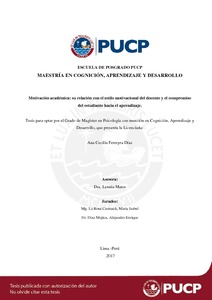| dc.contributor.advisor | Matos Fernández, Lennia | |
| dc.contributor.author | Ferreyra Díaz, Ana Cecilia | es_ES |
| dc.date.accessioned | 2017-07-24T15:12:14Z | es_ES |
| dc.date.available | 2017-07-24T15:12:14Z | es_ES |
| dc.date.created | 2017 | es_ES |
| dc.date.issued | 2017-07-24 | es_ES |
| dc.identifier.uri | http://hdl.handle.net/20.500.12404/9118 | |
| dc.description.abstract | El presente estudio, basado en la Teoría de la autodeterminación, examina la relación entre
el estilo motivacional del docente que percibe el estudiante, su motivación académica y los tipos de
compromiso hacia su aprendizaje. La muestra estuvo compuesta por 851 estudiantes de la carrera
de administración de una universidad privada de Lima. El análisis de datos se realizó a través de un
modelo de ecuaciones estructurales para comprobar las relaciones propias del “Bright side” donde
se espera que la percepción sobre el apoyo a la autonomía brindado por el docente se vincule con la
motivación autónoma del estudiante, el compromiso agente y el compromiso conductual hacia su
aprendizaje; y las relaciones propias del “Dark side” donde se espera que la percepción sobre el
estilo motivacional de control del docente, se vincule con la motivación controlada del estudiante,
la falta de compromiso agente, la falta de compromiso conductual hacia su aprendizaje y la ansiedad
ante la evaluación.
Con un índice de ajuste del modelo adecuado (X2(245)=752.64 (p<,01), RMSEA=.050,
SRMR=.051, CFI=.96) se encontró que, según lo esperado con el patrón “Bright side”, existe una
relación positiva entre la percepción sobre el apoyo a la autonomía, el compromiso agente y el
compromiso conductual, teniendo como variable mediadora la motivación autónoma del estudiante
hacia su aprendizaje. Por otra parte, consistente con el patrón “Dark side”, se encontraron relaciones
positivas y significativas entre la percepción sobre el estilo motivacional de control, la falta de
compromiso agente, falta de compromiso conductual y ansiedad ante la evaluación, teniendo como
variables mediadoras la motivación controlada y la desmotivación del estudiante hacia su
aprendizaje.
Así, se encuentra que el estilo motivacional del docente predice la calidad de la motivación,
y consecuentemente, el compromiso del estudiante hacia su aprendizaje. Así, se discute el alcance
y limitaciones de los resultados. Para futuras investigaciones, entre otros puntos, se recomienda
utilizar otras fuentes de información, como las observaciones en clase, para reconocer el estilo
motivacional del docente e indagar sobre el tipo de compromiso que presenta el estudiante hacia el
aprendizaje, a través de la percepción del docente acerca de ello. | es_ES |
| dc.description.abstract | The present study, based on Self-determination Theory, examines the relationship between
the motivational teaching style perceived by the student, their academic motivation and the types of
engagement to their learning. The sample consisted of 851 students of a management program from
a private university in Lima.
Using Structural Equation Modeling (SEM), we studied the relationships of the "Bright
side" pattern (where perceived autonomy support is expected to be linked to the autonomous
motivation of the student, agentic and behavioral engagement), and the relationships of the "Dark
side" pattern (where perceived controlling teaching is expected to be linked to controlled motivation,
lack of agent engagement, lack of behavioral engagement and text anxiety).
The model showed good fit indices (X2(245)=752.64 (p<,01), RMSEA=.050,
SRMR=.051, CFI=.96). On the one hand, consistent with the “Bright side” pattern, the results
showed a positive relationship between perceived autonomy-supportive teaching, agentic and
behavioral engagement, mediated by autonomous motivation. On the other hand, consistent with
the "Dark side" pattern, positive and significant relationships between the perceived controlling
teaching, lack of agent and behavioral engagement, and test anxiety, being mediated by controlled
motivation and amotivation were found.
Finally, this study shows that the motivational style of the teacher predicts the quality of
student’s motivation, and consequently, his/her engagement towards learning. For future research,
among others, it is recommended to use other sources of information, such as classroom observation,
to recognize the motivational style of the teacher and to explore the engagement that the student
presents to the learning, through the teacher's perception about it | es_ES |
| dc.language.iso | spa | es_ES |
| dc.publisher | Pontificia Universidad Católica del Perú | es_ES |
| dc.rights | info:eu-repo/semantics/openAccess | es_ES |
| dc.rights.uri | http://creativecommons.org/licenses/by-nc-nd/2.5/pe/ | * |
| dc.subject | Motivación (Educación) | es_ES |
| dc.subject | Aprendizaje (Educación) | es_ES |
| dc.subject | Personal docente | es_ES |
| dc.title | Motivación académica: su relación con el estilo motivacional del docente y el compromiso del estudiante hacia el aprendizaje | es_ES |
| dc.type | info:eu-repo/semantics/masterThesis | es_ES |
| thesis.degree.name | Magíster en Cognición, Aprendizaje y Desarrollo | es_ES |
| thesis.degree.level | Maestría | es_ES |
| thesis.degree.grantor | Pontificia Universidad Católica del Perú. Escuela de Posgrado | es_ES |
| thesis.degree.discipline | Cognición, Aprendizaje y Desarrollo | es_ES |
| renati.discipline | 199237 | es_ES |
| renati.level | https://purl.org/pe-repo/renati/level#maestro | es_ES |
| renati.type | http://purl.org/pe-repo/renati/type#tesis | es_ES |
| dc.publisher.country | PE | es_ES |
| dc.subject.ocde | https://purl.org/pe-repo/ocde/ford#5.01.00 | es_ES |






